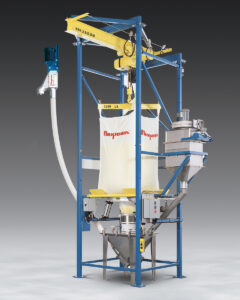In the fast-paced and dynamic hospitality industry, efficiency and functionality play pivotal roles in ensuring smooth operations. Hotels, amidst their complex infrastructure and diverse services, rely on numerous systems and equipment to meet the needs of their guests. One such often overlooked but crucial piece of machinery is the Super Sack Unloader. This unsung hero streamlines processes, enhances productivity, and maintains high standards of service within hotel establishments.
Understanding the Super Sack Unloader
Hotels deal with a myriad of materials, from linens and towels to cleaning supplies and food ingredients. Super Sack Unloaders, also known as bulk bag unloaders, are specialized machines designed to efficiently and safely handle and unload large, bulk bags of materials. They’re equipped with mechanisms to lift, position, and empty these bags, minimizing manual handling and ensuring precise discharge of contents.
Ensuring Operational Efficiency
In a bustling hotel environment, time is of the essence. Super Sack Unloaders streamline material handling processes, reducing the time and labor required to unload bulk bags. This efficiency directly translates into increased productivity, allowing staff to focus more on guest-centric services rather than manual labor.
Enhancing Safety Measures
Hotels prioritize guest and staff safety. Manual handling of heavy bulk bags poses potential risks of accidents or injuries. Super Sack Unloaders mitigate these risks by automating the unloading process, eliminating the need for manual lifting or maneuvering of heavy bags, thereby ensuring a safer working environment for hotel employees.
Maintaining Hygiene and Quality Standards
Consistency in quality and hygiene is paramount in the hospitality sector. Super Sack Unloaders are designed with materials and features that prevent contamination or spillage during the unloading process. This ensures that materials like food ingredients or cleaning supplies maintain their integrity and meet the hotel’s high standards.
Cost-Effectiveness and Resource Optimization
While the initial investment in a Super Sack Unloader may seem significant, its long-term benefits outweigh the costs. By reducing labor hours, minimizing material wastage, and optimizing operational efficiency, hotels can achieve cost savings and better resource utilization, contributing to overall profitability.
Versatility in Applications
The versatility of Super Sack Unloaders makes them suitable for various hotel departments. Whether unloading bulk food items for the kitchen, handling laundry supplies for housekeeping, or managing maintenance materials, these machines adapt to diverse operational needs within the hotel.
Environmental Impact and Sustainability
Hotels are increasingly aligning their practices with sustainability goals. Super Sack Unloaders contribute to sustainability efforts by reducing material wastage and promoting efficient resource usage. Additionally, they minimize the need for single-use packaging, aligning with eco-friendly initiatives.
Conclusion
In the highly competitive landscape of the hospitality industry, hotels are continuously seeking ways to enhance efficiency, maintain quality standards, and ensure the safety of their guests and staff. The inclusion of a Super Sack Unloader in a hotel’s infrastructure may seem like a minor detail, but its impact is significant. From optimizing operations to upholding safety measures and sustainability goals, these machines are an indispensable asset for hotels aiming to streamline processes and deliver exceptional guest experiences.
In essence, the adoption of Super Sack Unloaders aligns with the ethos of hospitality: ensuring a seamless and superior service experience while enhancing operational efficacy and sustainability efforts. As hotels evolve to meet the ever-changing needs of their guests, integrating such innovative equipment becomes imperative, marking a step towards progress and excellence in the hospitality industry.

